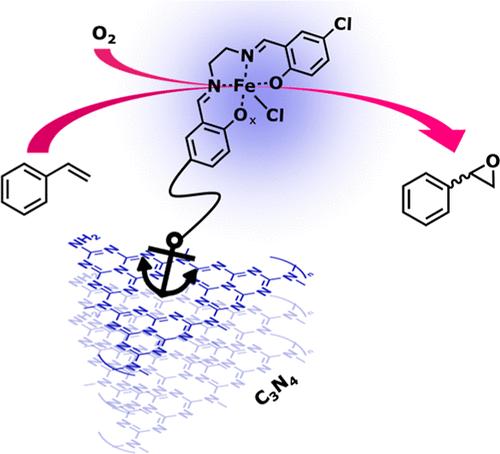Covalently Anchored Molecular Catalyst onto a Graphitic Carbon Nitride Surface for Photocatalytic Epoxidation of Olefins
IF 11.3
1区 化学
Q1 CHEMISTRY, PHYSICAL
引用次数: 0
Abstract
This study explores an innovative photocatalytic approach using pristine graphitic carbon nitride (C3N4) to anchor iron salen-type complexes (FeSalenCl2) without the need for additional linkers or heterojunctions. The resulting hybrid catalyst, [C3N4-FeCl(Salen)]Chem, exhibits a promising catalytic performance in the selective epoxidation of cyclic and linear olefins using gaseous oxygen as the oxidant. The catalyst’s selectivity closely resembles that of the free iron complex, and its effectiveness varies depending on the olefin substrate. Additionally, solvent selection plays a critical role in achieving optimal performance, with acetonitrile proving to be the best choice. The study demonstrates the potential of C3N4 as an environmentally friendly, recyclable, and efficient support for molecular catalysts. The results highlight the versatility and significance of C3N4-based materials in advancing light-driven catalysis.

氮化石墨碳表面共价锚定分子催化剂在烯烃光催化环氧化中的应用
本研究探索了一种创新的光催化方法,即利用原始石墨氮化碳(C3N4)锚定铁莎伦类络合物(FeSalenCl2),而无需额外的连接体或杂结。由此产生的混合催化剂 [C3N4-FeCl(Salen)]Chem,在以气态氧为氧化剂的环状和线性烯烃的选择性环氧化反应中表现出良好的催化性能。该催化剂的选择性与游离铁络合物的选择性十分相似,其有效性因烯烃底物的不同而不同。此外,溶剂的选择在实现最佳性能方面起着关键作用,乙腈被证明是最佳选择。这项研究证明了 C3N4 作为一种环保、可回收和高效的分子催化剂载体的潜力。研究结果凸显了基于 C3N4 的材料在推进光驱动催化方面的多功能性和重要性。
本文章由计算机程序翻译,如有差异,请以英文原文为准。
求助全文
约1分钟内获得全文
求助全文
来源期刊

ACS Catalysis
CHEMISTRY, PHYSICAL-
CiteScore
20.80
自引率
6.20%
发文量
1253
审稿时长
1.5 months
期刊介绍:
ACS Catalysis is an esteemed journal that publishes original research in the fields of heterogeneous catalysis, molecular catalysis, and biocatalysis. It offers broad coverage across diverse areas such as life sciences, organometallics and synthesis, photochemistry and electrochemistry, drug discovery and synthesis, materials science, environmental protection, polymer discovery and synthesis, and energy and fuels.
The scope of the journal is to showcase innovative work in various aspects of catalysis. This includes new reactions and novel synthetic approaches utilizing known catalysts, the discovery or modification of new catalysts, elucidation of catalytic mechanisms through cutting-edge investigations, practical enhancements of existing processes, as well as conceptual advances in the field. Contributions to ACS Catalysis can encompass both experimental and theoretical research focused on catalytic molecules, macromolecules, and materials that exhibit catalytic turnover.
文献相关原料
| 公司名称 | 产品信息 | 采购帮参考价格 |
|---|
 求助内容:
求助内容: 应助结果提醒方式:
应助结果提醒方式:


